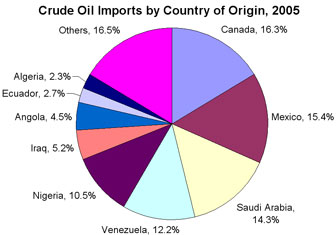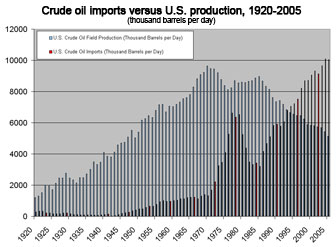Middle East oil less important than African oil for US
Middle East oil less important than African oil for US
mongabay.com
February 22, 2007
Preliminary data from the Energy Information Administration indicate that U.S. crude oil imports from Africa exceeded supplies from the Middle East in 2006 for the first time in 21 years.
Crude imports from Africa leapt 4.8 percent from 2005 to 2.23 million barrels per day, the highest level since 1979. Imports from the Middle East were only fractionally lower at 2.22 million barrels per day, but dropped for the third consecutive year, according to Dow Jones.
Overall U.S. crude imports were 10.095 million barrels a day, a 0.3 percent drop from a year ago when imports set an all-time record.
Canada is the largest foreign supplier of oil since 2004. In 2006 the country sent some 1.782 million barrels a day to the U.S., a 9 percent increase over 2005.
Imports from Saudi Arabia, the world’s largest oil exporter, fell 1.7 percent to 1.42 million barrels a day, the lowest volume since 1999. Imports from Kuwait fell 21 percent.
Crude imports from Venezuela also fell (8.2 percent).
Two African countries saw large leaps in exports to the United States: Angola (+34 percent) and Algeria (+57 percent). U.S. imports from Nigeria, Africa’s largest oil producer, fell 3.2 percent on the year to 1.043 million barrels a day, due largely to civil unrest in the key oil-producing region, notes Dow Jones.
This article uses information from past mongabay.com posts.

